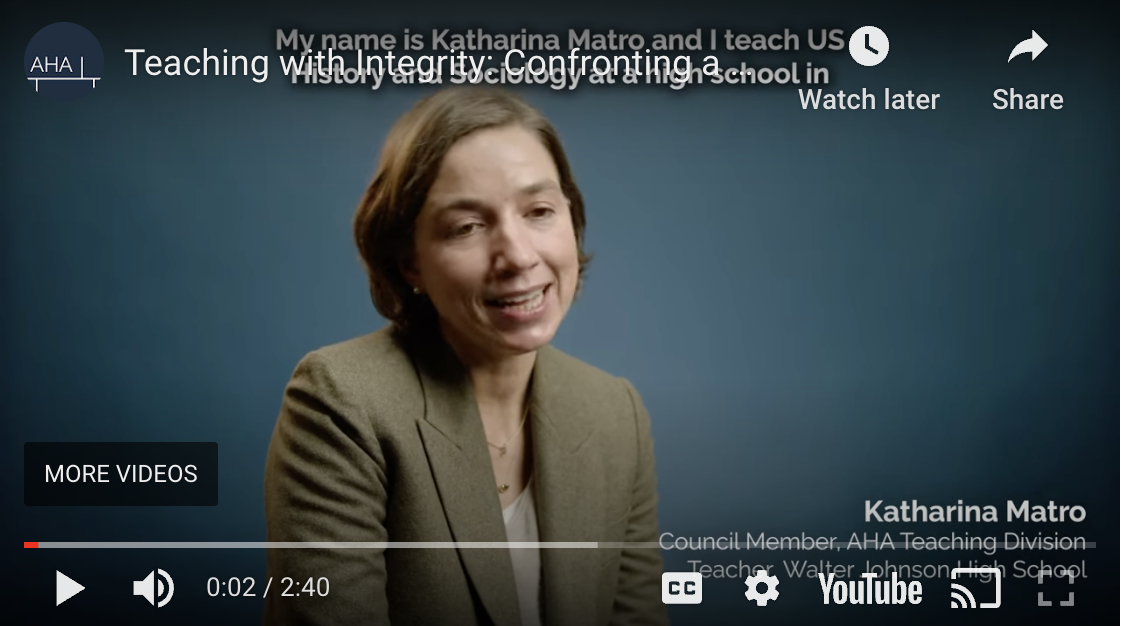High quality social studies education is an essential tool to maintain and advance American democracy. American history teachers follow rigorous professional standards because they understand this enormous responsibility. The organizations and principles below aim to support teacher in the challenging environment that many of them face across the United States today.
A powerful and rigorous social studies curriculum provides strategies and activities that engage students with significant ideas, and encourages them to connect what they are learning to their prior knowledge and to current issues, to think critically and creatively about what they are learning, and to apply that learning to authentic situations.
- National Council for the Social Studies - A Vision of Powerful Teaching and Learning in the Social Studies - 2022
Link to the video of teacher Katharina Matro from the American Historical Association.
Key strategies for teaching history with integrity today.
Over the past year and a half, I have heard personal testimony in person and in virtual meetings from many teachers and leaders in professional associations of teachers and historians as they seek a path for teaching with integrity in the face of political and legal attacks. I compiled the following list of strategies from this testimony and from statements by the National Council for the Social Studies, the American Historical Association, and the National Council of Teachers of English.
- Read statements by national professional associations of social studies, English teachers, and others. (See below.)
- Build your community. Teachers, family, and other educators. Ask for support.
- DO something. Sit in on a school committee meeting. Write to your legislators. Explain what you do and do not teach. (e.g. We do not indoctrinate students. To do so would violate our professional standards.) Write a thank you the NCSS or NCTE for their work to support teachers. Reach to a colleague who you know is struggling. But do what you CAN do.
- Read the restrictive education laws. What do they actually say?
- Sign up to help when your state reviews disciplinary standards. (Many states do so on a scheduled cycle.)
- Join your professional association at the state and national levels. Participate.
Professional Responses to Classroom Censorship
The National Council for the Social Studies released a statement: A Vision of Powerful Teaching and Learning in the Social Studies to clearly state the professional standards that guide us. This is where we stand. Read this statement and others by allied professional organizations.
- National Council for the Social Studies Statements
- Especially: A Vision of Powerful Teaching and Learning in the Social Studies
- American Historical Association - 2021 Statement
- Freedom to Teach: A Statement Against Banned Books - The National Council of Teachers of English joined this statement.
- National Education Association statement
- "America’s Censored Classrooms" - PEN America (writers’ organization)
- Choices Program - Brown University
- RISE - DePaul University - Professional Development on support and skills for teaching in difficult times. [This group is phenomenal! RC]
- Teaching with Integrity: Historians Speak - American Historical Association
- Short, powerful video statements, including the one featured above.
Teaching Media Literacy
Students need to learn the rules of journalism and how to distinguish between responsible news and opinion or even deliberate misinformation.
- Civic Online Reasoning - Stanford History Education Group
- “Countering Online Hate Speech” - Learning for Justice media literacy video (6:18 mins).
- “Can You Spot Misinformation?” (1:52 minutes). Retro Report.
EdWeek Map of Classroom Censorship Laws
Even though no one actually seems to be teaching Critical Race Theory in American K-12 schools, extremists are using the term to mask a coordinated national censorship campaign. Journalists at EdWeek keep current this list of classroom censorship laws by state. Read the legislation for yourself.




